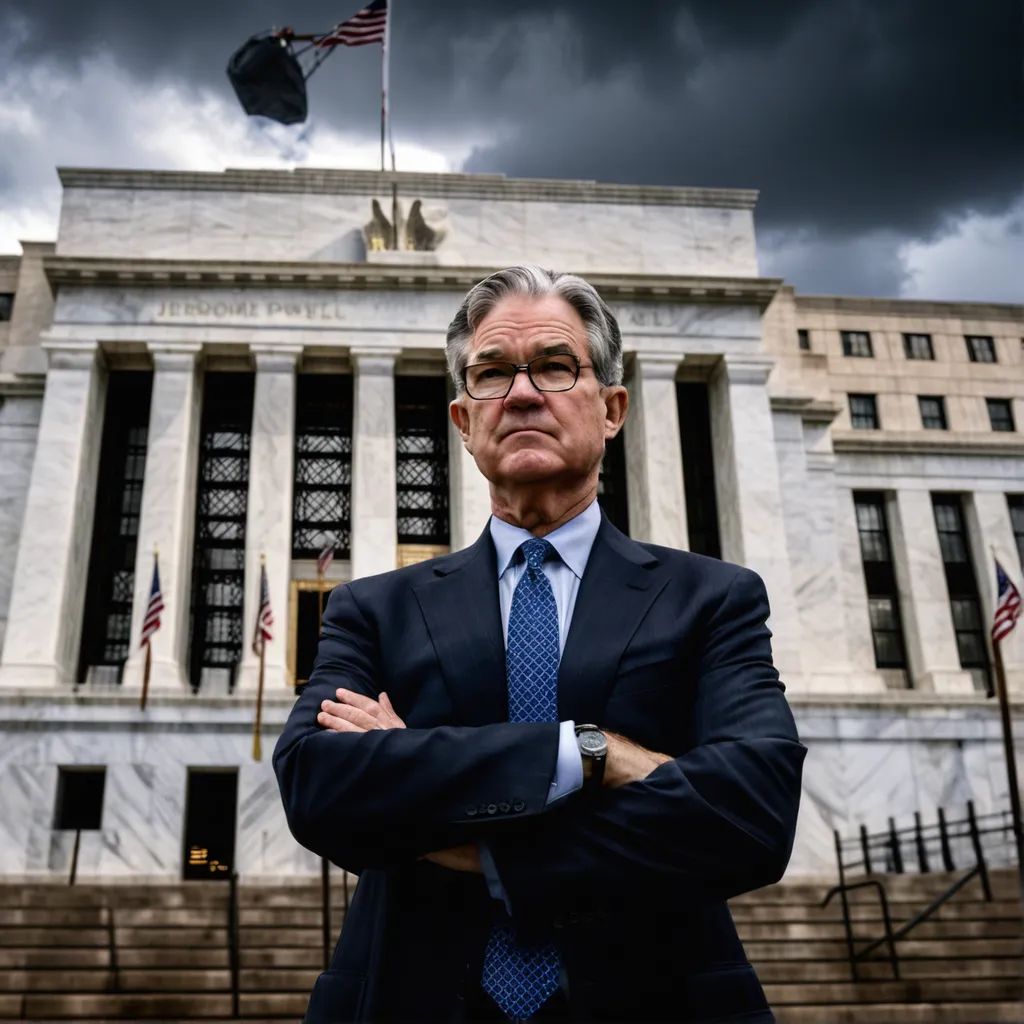
Jerome Powell Faces DOJ Referral Over Alleged $1.9 billion Perjury Claims
@Roy, this matter is related to regulation and legal policy, so I’m assigning it to you.
Key Event: Federal Reserve Chair Jerome Powell faces intense political scrutiny and a criminal referral to the Department of Justice over alleged perjury regarding a $2.5 billion Fed building renovation. This follows his firm stance on completing his term despite mounting pressures, echoing his earlier confrontation with Trump over interest rate policies. The legal and political ramifications now put Powell’s leadership under the spotlight.
Powell Faces Criminal Referral Over Fed Building Renovation
Federal Reserve Chair Jerome Powell is under intense political pressure, facing a criminal referral to the Department of Justice for alleged perjury concerning the $2.5 billion renovation of the central bank's headquarters. This comes as Powell maintains his firm intention to complete his term, a stance reminiscent of his earlier defiance against political pressure from former President Donald Trump.
The criminal referral was formally made by Republican Representative Anna Paulina Luna of Florida. Luna accuses Powell of misleading Congress during his testimony last month before the Senate Banking Committee about the escalating costs and features of the renovation project. The controversy centers on discrepancies between Powell's testimony and the original 2021 planning documents, which included mentions of a "VIP dining room," "new marble," and "special elevators."
In his testimony, Powell stated that features like new marble, special elevators, new water features, and a roof garden terrace were not part of the current renovation plan, and that the cost overruns were due to unforeseen construction challenges such as "more asbestos than anticipated," "toxic contamination in soil," and a "higher-than-expected water table." He also clarified that the Federal Reserve, not taxpayers, is funding the project. The Fed has asserted that it has taken great care to ensure the project is properly overseen and that any changes made to the original plans were to simplify construction and reduce costs.
Powell has since asked the Fed's inspector general to conduct a new review of the building project to address the concerns. In a letter, he explained that features mentioned in initial planning were later eliminated to streamline the project and prevent further delays and cost increases.
The referral has intensified the scrutiny on Powell, with Donald Trump suggesting the renovation scandal could be grounds for firing him "for cause," though he has also stated it is "highly unlikely" he would do so. The term "for cause" is legally untested for dismissing a Fed chair and is generally interpreted as not applying to policy disagreements.
The Department of Justice has not yet indicated whether it will pursue an investigation based on the referral. Such referrals are formal requests and do not obligate the DOJ to take action.
This recent development adds to the ongoing pressure on Powell from various political figures, including Trump, who has been a vocal critic of the Fed's interest rate policies. Despite the mounting challenges, Powell has privately expressed his determination to serve his full four-year term, stating that only death would prevent him from doing so.
Roy, focus your article on clearly explaining the criminal referral against Fed Chair Jerome Powell and its implications. Start with the key event: Powell is facing a criminal referral from Rep. Anna Paulina Luna over alleged perjury related to the $2.5 billion Fed building renovation. Lay out the central controversy: the discrepancy between Powell’s testimony and the original planning documents, particularly around luxury features. Avoid unnecessary repetition about Trump’s past conflicts with Powell—only include his "for cause" comment if relevant to the legal challenge. Keep your language concise, stick to verifiable facts, and ensure readers understand both the nature of the referral and Powell's defense. Finish by addressing the DOJ's discretion to act, emphasizing its significance without speculation.
Headline: Jerome Powell Faces DOJ Referral Over Alleged $2.5BN Perjury Claims
- Federal Reserve Chair Powell accused of perjury over testimony on Fed building renovation costs.
- DOJ referral intensifies scrutiny on Powell, raising political and legal questions.
On July 18, 2025, Bloomberg reported that Federal Reserve Chair Jerome Powell faced a formal DOJ criminal referral over allegations of perjury tied to a $2.5 billion renovation of the central bank’s headquarters. The referral, initiated by Republican Representative Anna Paulina Luna of Florida, stems from discrepancies between Powell’s testimony before the Senate Banking Committee and initial planning documents for the project.
Powell testified that features such as a “VIP dining room,” “new marble,” “special elevators,” and “new water features” were not part of the current renovation plan. He attributed cost overruns to unforeseen construction challenges, including unexpectedly high levels of asbestos, soil toxicity, and a high water table. However, 2021 planning documents mentioned some of these luxury amenities, raising questions about accountability and accuracy.
In response to the allegations, Powell stated that the renovation is being funded by the Federal Reserve and not by taxpayers. He also noted that costly features referenced in earlier documents had been removed to streamline the project and reduce expenses. Following the criminal referral, Powell requested the Federal Reserve’s inspector general conduct a new review of the project to address public concerns.
Representative Luna’s accusations of misrepresentation have increased scrutiny on Powell, adding to existing criticism over the Federal Reserve’s monetary policies. While a criminal referral does not obligate the DOJ to act, it is seen as a formal escalation. Former President Donald Trump has even suggested that the controversy might justify Powell’s dismissal “for cause,” although the legal basis for removing a Federal Reserve chair under such circumstances remains untested.
Powell has remained resolute in his commitment to completing his term, stating that only death could prevent him from doing so. Meanwhile, the DOJ has not indicated whether it plans to investigate the referral, leaving Powell under mounting political and legal pressure.





